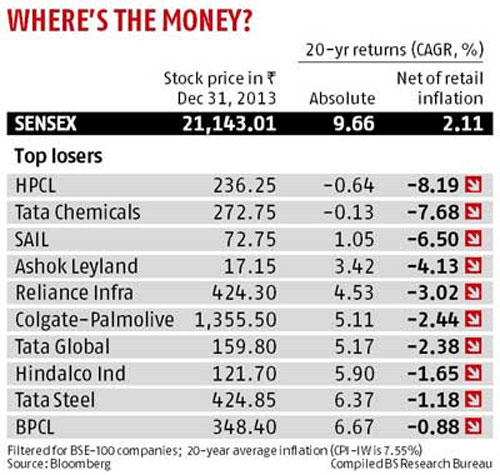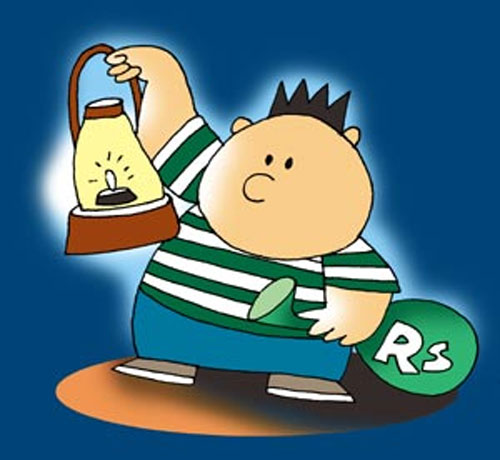Photographs: Illustration: Uttam Ghosh/Rediff Joydeep Ghosh in Mumbai
The marquee names include Hindalco, three Tata group companies and Colgate
Hindalco, Tata Steel, Colgate-Palmolive, Ashok Leyland and Reliance Infrastructure are some of the marquee names in the Indian stock markets. But investors in these stocks would be surprised to know that their returns, even over a 20-year period, have trailed the inflation rate.
Two other Tata Group stocks — Tata Chemicals and Tata Global Beverages — also figure in this list. But the group can take heart from the fact that the Titan stock’s returns, at 11.68 per cent, beat the rate of inflation. The group’s top performer, Tata Consultancy Services, wasn’t listed 20 years ago.
Not surprisingly, three public-sector companies — Hindustan Petroleum Corporation, Steel Authority of India Ltd and Bharat Petroleum Corporation Ltd — have also failed to pass the inflation test.
Click on NEXT for more...
Many blue-chip stocks fail the inflation test
Photographs: Illustration: Uttam Ghosh/Rediff
Consider this: Returns given by 10 of the BSE-100 stocks (only 46 stocks on this index have been listed for 20 years) are below the inflation rate — considering the average Consumer Price Index (CPI) -based inflation (for industrial workers) at 7.55 per cent (see table). If one considers the average Wholesale Price Index (WPI)-based inflation rate, at 6.55 per cent, the returns would be slightly better.
Among the BSE-100 companies that have exceeded the inflation rate, 21 have done so by 30 basis points to 10 percentage points, while only 15 by more than 10 percentage points.
The BSE benchmark Sensitive Index, or Sensex, hasn’t disappointed much. With 2.11 per cent compound annual growth rate (CAGR) over CPI in the 20-year period, the index would have helped investors make a reasonable amount of money. Thirty-three stocks have given returns of more than this number. Stocks like Infosys, Wipro, Sesa Sterlite, Cipla and Hero MotoCorp have given inflation-adjusted returns of 18-34 per cent.
Click on NEXT for more...

Many blue-chip stocks fail the inflation test
Photographs: Illustration: Uttam Ghosh/Rediff
So, is the myth of long-term investing in blue-chips stocks a myth? Axis Capital MD & CEO Nilesh Shah says, even if you have bought a blue-chip stock, two things are important.
One, buying at a good price; and two, if the blue-chip changes its business decision, it’s time to evaluate and (if needed) exit the stock.
Some like Hindalco and Tata Steel were companies with great cash flows. But, when their business models changed and they went for big acquisitions, their books became debt-laden and investors suffered.
Others like Colgate-Palmolive ran out of steam after giving fabulous returns for almost two decades since their listing in the 1970s.
Click on NEXT for more...
Many blue-chip stocks fail the inflation test
Photographs: Illustration: Uttam Ghosh/Rediff
Investment consultant Gul Tekchandani believes that one has to constantly monitor and check numbers like return on equity and return on capital, based on quarterly or half-yearly numbers. “You just can’t buy a stock and hold it forever.
Give it time for three years to perform and then exit. Also, when the economic growth rate comes down from eight per cent to four per cent, some sectors are bound to suffer,” he says.
V K Sharma, head of business (private broking & wealth management), HDFC Securities, says that he believes stocks, especially cyclical ones, need to be sold before they peak.
In fact, he adds, investors without passion or time for research should choose index exchange-traded funds, as good stocks are held in the index and bad ones automatically get thrown out. In the Nifty 50, there have been 73 changes since its inception in 1993.






article